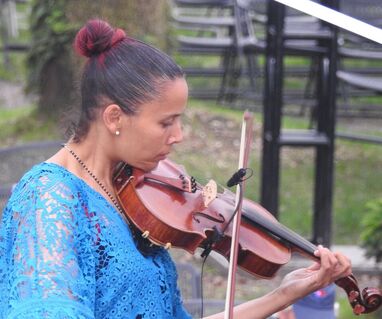Such has been the case with the opera entitled Omar, a new work from Rhiannon Giddens and Micheal Abels. As a Grammy-winning singer and multi-instrumentalist, Giddens uses her musical talents to explore the African diasporic relations to European and American folk and popular genres. Abels is best known as a film score composer for the critically acclaimed Jordan Peal Horror films Get Out (2017) and Us (2019). Their collaboration on Omar (with Giddons as the librettist/musician and Abels as the composer) presents an important work about preserving enslavement narratives, in addition to addressing religious belief systems as forms of communication and hope through struggles. Listening to Giddons and Abels speak with Martha Teischner at the 2022 Spoleto Festival USA, Giddens and Abels set Omar Ibn Said’s life story to music by basing the libretto on his recently recovered autobiography, which sheds light on both his decades in captivity from Senegal to the United States in the nineteenth century and the impact of his devotion to Islam. The collaboration proved both a challenging and important experience in helping to elevate the operatic genre and help to erase the stigma of exclusivity. It does not sugarcoat the horrors and pain of African enslavement through tense moments in the music via depictions of cruelty and physical violence. Even though Omar is presented to viewers primarily through Western orchestral and folk instruments and sung in the English language through rhyme schemes, Giddons and Abels still maintain cultural respect by incorporating chanted passages from the Quran in Arabic to stress the significance of Omar as an enslaved African, as a Muslim, and above all as a human being.
[1] The backlash, petitions, and boycotts behind the Mary D. Watkins opera Emmett Till, A New American Opera (2022) had more to do with the libretto by Clare Cross, which included a fictional character and suggested a "White Savior/Guilt" narrative in the work.


 RSS Feed
RSS Feed
